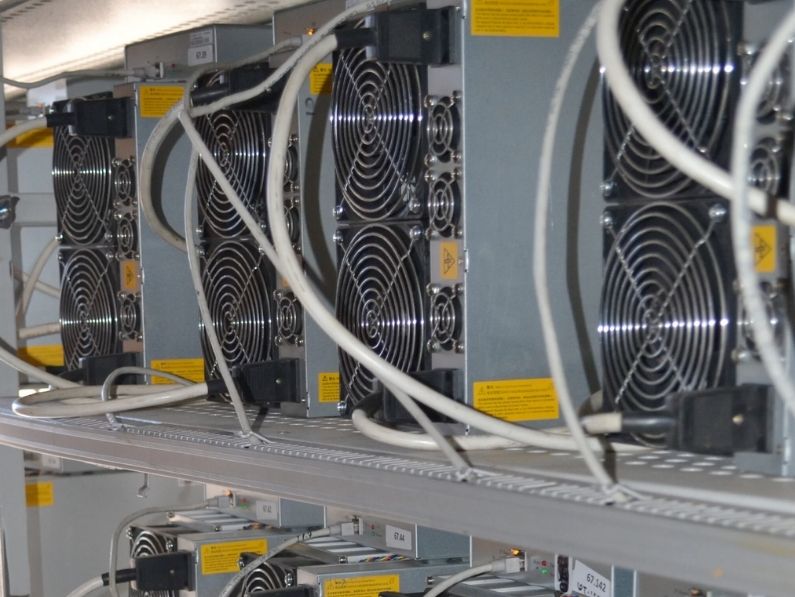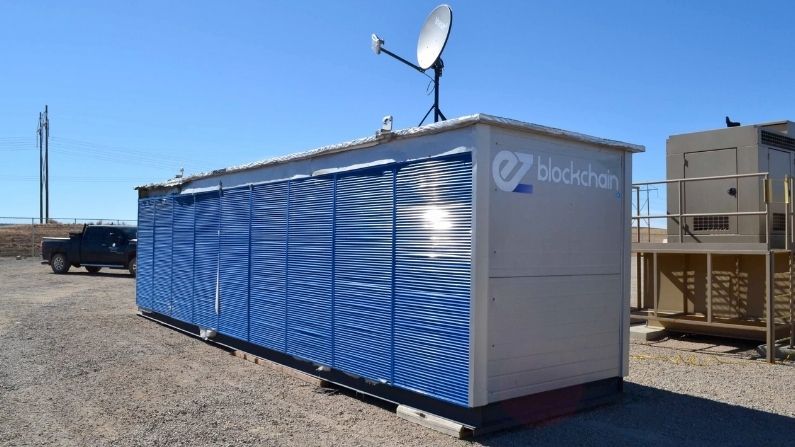This story comes to KHOL through the Rocky Mountain Community Radio collaborative.
Operators at Wesco’s Blue Hills natural gas processing plant near Moab, Utah, had a problem. After the Greentown pipeline was shut down by regulators who deemed it hazardous, Blue Hills’ gas was left stranded.
“And unfortunately, these oil wells are not like your kitchen faucet where you can turn it on and off at your pleasure,” said Steve Degenfelder, land manager and spokesman for Wesco Operating and Kirkwood Oil and Gas. “And so we had no other recourse than to flare the gas that would have otherwise been sold down the pipeline.”
Conservationists and locals criticized that flaring as an eyesore and environmental toll in the pristine southern Utah landscape known for being a Dark Sky area. But last year, a company called EZ Blockchain offered a solution – their EZ Smartbox Mobile Mining Unit.
About the size of a shipping container, the mobile mining unit stores an off-the-grid mobile data center, a wall of fans, and a number of computers running complex algorithms. Its purpose? To virtually mine Bitcoins.
“They just do one thing, they mine cryptocurrency. They mine Bitcoin specifically,” said Luis Arauz, an operations manager at EZ Blockchain. “You plug in power, you plug in an ethernet cable, you connect it to the mining pool and you’re done.”

Cryptocurrency mining requires a lot of energy to power multiple computers running complex algorithms. (Courtesy of EZ Blockchain)
Arauz helped set up Wesco’s Bitcoin box. His company also has mining boxes in Wyoming, Canada and New York.
He explains that the problem with Bitcoin mining is that it takes a lot of energy. Currently total Bitcoin mining in the world uses around 120 Terawatt hours per year. That’s more than the yearly consumption of Argentina. Entrepreneurial miners have searched the world for cheap sources of electricity to make their mining profitable.
“Let’s say aluminum and steel plants that were no longer being used, abandoned hydro-electric plants, coal mining. Areas like that,” Arauz said.
A cheap source of electricity is just what oil and gas plants like Blue Hills have.
“Why can’t we turn the biggest black eye of cryptocurrency mining and turn it into one of its benefits? Because for many of these operations, they need to be able to have something that will constantly use energy in a small footprint,” Arauz said.
According to Degenfelder at Wesco Operating, running the gas through a generator rather than burning it also cuts down on emissions. Not to mention that one Bitcoin today is worth over $50,000. And a once wasted resource can now make Wesco real money.
A company like Blue Hills might get around $2 per thousand cubic feet of natural gas if sold through a pipeline. But today they could make $30 per thousand cubic feet if that resource is used to generate electricity for Bitcoin mining.
“You’d be looking at about $208,000 per month,” said Arauz.
Meanwhile, Degenfelder said his company’s tax burden hasn’t changed. They still pay local and state production taxes and royalty on the gas used. And what they end up mining in cryptocurrency is reported to the state.
Around the country, operators are looking for ways to benefit from otherwise wasted or stranded natural gas.
“Everybody gets infatuated with the term Bitcoin, but it could be utilizing that natural gas to generate electricity that’s off the grid that earns something else,” said Degenfelder.
For this plant outside of Moab, cryptocurrency mining made the most sense. Of course, the future value of Bitcoin isn’t very certain. But, as this pandemic showed, neither is the price for gas.






